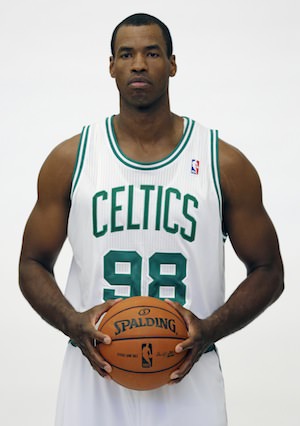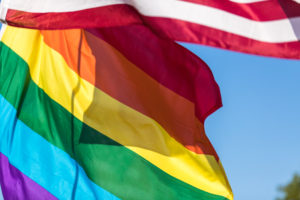Truthdigger of the Week: Jason Collins
As welcoming as the country has been to Jason Collins, the first openly gay man in major sports, he deserves even more credit than he's received so far.
Every week the Truthdig editorial staff selects a Truthdigger of the Week, a group or person worthy of recognition for speaking truth to power, breaking the story or blowing the whistle. It is not a lifetime achievement award. Rather, we’re looking for newsmakers whose actions in a given week are worth celebrating. Nominate our next Truthdigger here.
“I don’t think this is Jackie Robinson,” sportswriter Tony Kornheiser said Monday on the popular ESPN show “Pardon the Interruption.” He was referring, of course, to Jason Collins coming out of the closet, the first active male athlete in any major American team sport to do so.
Like many commentators, Kornheiser and his partner, Mike Wilbon, praised Collins, said this was long overdue in sports and agreed that anyone who stands in his way is a numskull. But Robinson he ain’t.
That’s fair. When Robinson became the first African-American player to take the field with a Major League Baseball team in 1947, he faced such naked bigotry that his own safety, during and in between games, was often in danger. Robinson was also an incredible talent at the beginning of his career. By contrast, Collins is a veteran free agent who, until recently, was little known except by sportswriters and his teammates. And whereas Robinson broke the color barrier in sports 16 years before Martin Luther King Jr. marched on Washington, Collins outed himself at a time when America appears to be increasingly comfortable with gay people.
Indeed, the reaction so far has been overwhelmingly positive. Kobe Bryant, arguably the biggest star in basketball, was quick to tweet, “Proud of @jasoncollins34. Don’t suffocate who u r because of the ignorance of others.” This, from a player who only two years ago was fined $100,000 for shouting “faggot” at a referee during a game.
Six years ago, retired basketball player John Amaechi came out and inspired this tirade by famed guard Tim Hardaway: “Well, you know I hate gay people, so I let it be known. I don’t like gay people and I don’t like to be around gay people. I am homophobic. I don’t like it. It shouldn’t be in the world or in the United States.” Hardaway came around in the end, at least publicly, another sign that the culture in sports has changed as quickly as it has in the rest of the country.
The most controversial reaction to Collins coming out has been ESPN analyst Chris Broussard’s comments that Collins troubles him as a Christian. Broussard has been roundly condemned for not getting into the spirit of things, and I don’t see the need to pile on. It’s hardly “I don’t like gay people,” nor does it amount to anything like the routine physical and emotional abuse Robinson had to endure in order to do his job.
And yet as welcoming as the nation has so far been to Collins, he deserves even more credit than he has gotten.
For one thing, we radically overestimate how “gay friendly” the country, especially the sports business, is. If it was so easy, so overdue, for a player to come out, why is Collins, in the year 2013, the first?
It turns out Collins didn’t want to wait that long. He reached a breaking point, he wrote in his Sports Illustrated cover story, when his Stanford roommate, Rep. Joe Kennedy, told him about marching in Boston’s 2012 gay pride parade:
I’m seldom jealous of others, but hearing what Joe had done filled me with envy. I was proud of him for participating but angry that as a closeted gay man I couldn’t even cheer my straight friend on as a spectator. If I’d been questioned, I would have concocted half truths. What a shame to have to lie at a celebration of pride.
Last season Collins played for the Boston Celtics and the Washington Wizards, and although he didn’t want his sexual orientation to distract from the teams, he wore the number 98 on his jersey, a reference to 1998, the year gay college student Matthew Shepard was tortured to death. He was getting ready.
Coach Doc Rivers and many players on the Celtics, which were eliminated Friday in the playoffs by the Knicks, had nice things to say about Collins, mainly about his work ethic, and, contrary to the implication of many slurs, his strength. Celtics guard Jason Terry said Tuesday, “We definitely needed his toughness. We’d love to have it in this series. He’s one of the toughest guys in the N.B.A.”
That’s a point that Collins himself was careful to underscore, almost bragging in his Sports Illustrated piece that he put another player on a stretcher. Talk of such brutality betrays an insecurity one might expect to find in a player who is risking a lot just to be himself.Little has been said of the role of race, but it’s an important subject. The second sentence in Collins’ article is “I’m black.” Anti-gay activists have long played on the prejudices of the black community against its gay members, but things are changing there too. President Obama endorsed same-sex unions, then the NAACP followed. So did prominent African-American celebrities and political figures, adding to the momentum. Again, the timing is just right for Collins, but we’re still only six years removed from Hardaway’s proud declaration, “I am homophobic,” and only a few days past Broussard saying Collins is in “open rebellion” of Jesus. Actually, Collins had something quite eloquent to say on the subject of Jesus:
I take the teachings of Jesus seriously, particularly the ones that touch on tolerance and understanding. On family trips, my parents made a point to expose us to new things, religious and cultural. In Utah, we visited the Mormon Salt Lake Temple. In Atlanta, the house of Martin Luther King Jr. That early exposure to otherness made me the guy who accepts everyone unconditionally.
So far things are going well for Collins. He is widely expected to end up on a team, despite his advanced age and limited skills. He had no way of knowing that before he stepped into the spotlight. In fact, a sportswriter friend of mine told me Collins’ agent wanted him to wait until he had a contract to make the announcement, for fear that teams would avoid the only openly gay player in the NBA. But Collins couldn’t wait any longer.
For many of us who spend time in the closet, typically when we’re kids, there’s a special shame our child brains are not really capable of processing. For those who keep their secrets into adulthood, the mental strain multiplies. Collins reached his breaking point when, at the age of 34, he still did not believe he had the right to take pride in himself.
“I wish I wasn’t the kid in the classroom raising his hand and saying, ‘I’m different,’ ” he writes. “If I had my way, someone else would have already done this. Nobody has, which is why I’m raising my hand.”
The commentators are right. This is long overdue, and Collins is not Robinson. He’s Jason Collins, a brave man who raised his hand long after someone else should have, but before anyone else could build up the nerve. He started the conversation, as he put it, and for that we honor him as our Truthdigger of the Week.
We cannot end without acknowledging the courage of another gay basketball player. Brittney Griner was the first player selected in the 2013 WNBA draft, a college star who will play professional basketball in the WNBA and in China. Two weeks ago she came out, with much less fuss. Perhaps it’s Griner who deserves credit for starting the conversation. Her advice is to “just be who you are. Don’t worry about what other people are going to say, because they’re always going to say something, but, if you’re just true to yourself, let that shine through. Don’t hide who you really are.”
Your support matters…Independent journalism is under threat and overshadowed by heavily funded mainstream media.
You can help level the playing field. Become a member.
Your tax-deductible contribution keeps us digging beneath the headlines to give you thought-provoking, investigative reporting and analysis that unearths what's really happening- without compromise.
Give today to support our courageous, independent journalists.



You need to be a supporter to comment.
There are currently no responses to this article.
Be the first to respond.